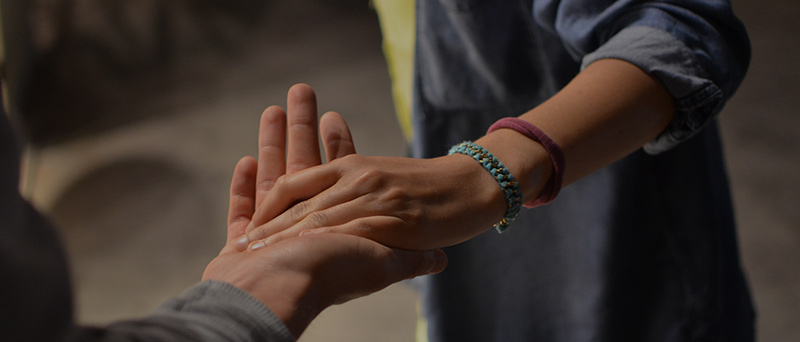
The following post was written by Laurie Krieg, a member of our Collaborative Team, and Founder and Executive Director of Hole in My Heart Ministries.
Sometimes, when I am meeting with people, I hit what I call a “suffering sentence.”
A suffering sentence is a brick wall of unavoidable pain I do not know how to tear down. Oh yes, I may know the right answers, but I also know that is not what they need. They need Emmanuel—God with us. They need El Roy—the God who sees us. They need Rapha—the healer.
I cannot be all of those things, but I can bring them to the One who is. I do this through the ancient spiritual discipline of lament and listening prayer.
I had been meeting with Christine for several months. She wrestles with gender dysphoria—feeling more masculine than her born-female body says. I am not a gender dysphoria expert, but I am learning God’s design for femininity and masculinity, and I know how to bring people’s pain to God.
A few minutes into the “how is it really going” part of my conversation with Christine, it was clear that today’s hurdle was clothing. “My closet feels like a bunch of costumes,” she said.
It was a suffering sentence.
Here is the reality: I had no idea how to make it better. And honestly? I couldn’t. I could empathize. I could be there for her. I could go shopping with her. I could say a million times in a million ways, “You are loved as you are,” but it would not permeate her soul like the words of God.
“Would you be willing to take this pain to Jesus with me?” I asked her.
I could sense some resistance. I hardly have a time where someone I am walking with isn’t resistant. They truly love Jesus. They have experienced taking their pain to God before, and know he is the only one who can satisfy. But it is difficult. We want clarity. We want answers now from the person who is before us.
But I knew I was at the end of Laurie’s answers. God always knows what we need—even if it is not what we want.
“It’s up to you, but you know and I know God can do more than I ever can,” I said.
She nodded. “Let’s pray.”
I looked at the clock like I always do and saw we had about 20 minutes until our mentoring meeting was through. Here we go, God. You can do in 20 minutes what I couldn’t do in 200 years.
We started by asking God to bring to Christine’s mind a place where she could “be safe and rest with God.”
Jesus “often withdrew to the lonely places and prayed.”[1] The word “lonely” or solitary is the Greek word eremos. There is a place just outside of Capernaum believed to be the place where Jesus withdrew called Eremos Hill, or as the locals call it, God’s Eye. It has a variety of flowers, birds, and a gorgeous view of a lake. It is the mountain of the beatitudes.[2] There is something about nature that connects our heart to the heart of the one who made nature.
Ideally, Christine and I would have been able to get away and pray on a mountain like Eremos, but we were stuck in our respective offices. We weren’t even in the same room—she was in another state, and we were talking through a video chat platform. Going to God in prayer and envisioning him in a nature-filled place connects both of us to God and to each other.
Theologian R.A. Torrey said, “We should never utter one syllable of prayer either in public or in private, until we are definitely conscious that we have come into the presence of God, and are actually praying to Him.”[3] Torrey goes as far as to say to pray without recognizing that we are speaking to the one “who lives in eternity” (Isaiah 57:15) and whose thoughts “are completely different from yours” (Is. 55:8) is to take God’s name in vain.
Christine needed to encounter, visualize, and feel safe with God—not simply pray to the blackness behind her eyelids.
God brought to mind a place where she could rest and feel safe. A wooded grove with a bench where she could sit. Christine said she could sense God behind her, hands on her shoulders. “I feel safe, cared for, and protected,” she said of the imagined location.
There is nothing like visualizing Emmanuel, ever-with-us God. However, I am always hyper-aware that I serve as a spiritual bodyguard. I must have the Bible over my ears to help guide her if something she says contradicts the Word. As Tim Keller said, “Without prayer that answers the God of the Bible, we will only be talking to ourselves.”[4] I never want to lead someone toward a god of our own making; I want them encounter the God of the Bible through prayer.
“When you’re ready, share with God how you felt about buying clothes this week,” I said.
This may seem trite. Doesn’t God have more important things to worry about? He would probably only care about the scary questions like, “Who am I?” I should wait until she is about to transition to male before stepping in to bring in the big guns: God. But it is a million of these “small” questions that lead to the larger ones. If I can help connect someone in these perceived small spaces to the God who sees me and Jesus who says he does not forget a sparrow and counts the hairs on our head then perhaps we will never reach that breaking point (Gen. 16:13, Luke 12:6-7).
I start with today. I start with buying clothes. I move into these “small” spaces because they are big to my friend, they are big to God, and so they must be big to me.
She poured out her heart in that safe space with Jesus and with me. “I hate being uncomfortable with who I am. I hate being uncomfortable with my body. I hate being judged. I hate feeling like I have to fit into this mold, this idea of womanhood.” She was on a roll. “It is crappy. Really crappy. I can tell people I hate going shopping, but it doesn’t encapsulate what I am feeling. All I am doing is finding clothes! It shouldn’t be this big, emotional deal. It’s dumb. So dumb.”
She paused, feeling the emotion. I sensed she needed to experience that God sees her and loves her—right now, while she feels “dumb.” This wasn’t my agenda; this was me listening to her, listening to the still small voice in my heart, and then guiding her toward experiencing the God of the Bible.
“Ask him, Christine,” I said. “Ask him, ‘Did you see me there? Shopping? All alone? Feeling stupid? Did you care?’”
I watched her face, eyes closed, visualizing it. She smiled through the tears. “All parts of our lives are important to him. Clothes shopping matters.”
This next part I learned from my mentor: Ask when and if Jesus ever felt what we felt. If we have a great high priest who can empathize with our weaknesses, he gets all of it (Heb. 4:15). So, guessing where God might guide her, I asked her to ask Jesus if he ever dealt with self-consciousness when it came to clothing.
“Did he ever feel like he had to fit into a mold he didn’t want to fit into?” I prompted.
She went for it. “Did you ever feel awkward about your clothes? About how you looked?”
The Holy Spirit brought something to her mind. “The soldiers mocked him. The people tried to get him to conform into the type of king they wanted—not the king he was. And when they finally called him “king” they were mocking him. They forced him to wear a crown of thorns. They stripped him to near nakedness.”
Tears came to my own eyes as I empathized with our great Empathizer. He must have felt so lonely there. He must have despaired seeing the people he made mock him.
“He was depressed and exhausted and they heaped shame on top of that,” Christine said. The tears fell freely as the connection began to permeate her heart.
“Does he get you?” I asked through my own tears.
“Yes!” She realized the weight of what she was seeing. “And he did all of that for me!”
He did. He died for her. He defeated shame for her. He endured ridicule for her. And he knew what it was like to wrestle with shame when it came to clothes.
Something small was actually something big.
“Is there anything he wants to show you or gift you with after seeing this?” I always ask this after someone throws up a lament onto God. I ask after it seems the emotion is done.
She laughed. “That white robe!” she said. She was referring to Revelation 7:9 and 10: “The great multitude that no one could count, from every nation, tribe, people and language, standing before the throne and before the Lamb. They were wearing white robes and were holding palm branches in their hands.”
“We’re all going to be wearing the same thing!” Christine said, chuckling.
I laughed, too, marveling at God’s unique way of meeting us exactly where we need. Noticing our time was coming to a close, I asked if she wanted to say anything to God. She did. “Thank you that this matters to you, but it’s not the source or primary influencer of my identity.”
I smiled, thinking about how I could have said that exact sentence to her at the start. We could have skipped the whole thing. Had I done that—had I depended on me for the answers instead of God—the impact would have been a grain of sand compared to experiencing God’s ocean of love.
Sometimes, when I meet with people, I hit what I call a “suffering sentence.” It is a brick wall of unavoidable pain I do not know how to tear down.
But God—who is Emmanuel, God with us, El Roy, the God who sees us, and Rapha, the healer—does.
Check out Grace/Truth!
A small group learning experience designed to help Christians engage in conversations about faith, gender, and sexuality.

